5 Ways to Stretch Your Ankles so You Can Move Easier
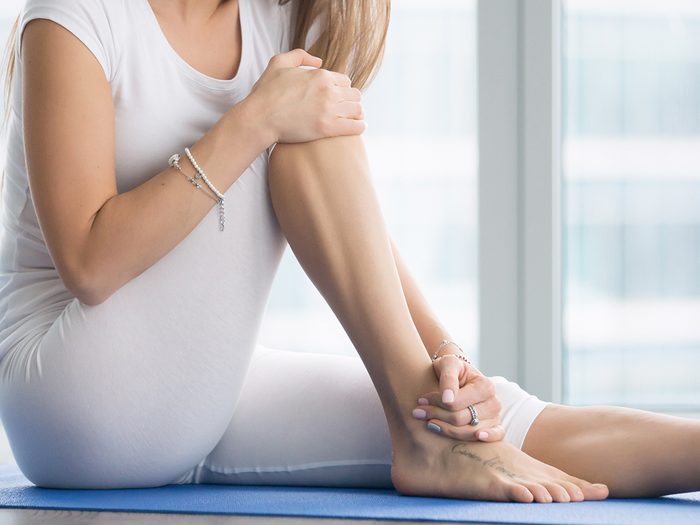
Whether you're feeling tightness or pain in your legs, these ankle stretches should be a part of your daily routine—they'll make your life easier.
It’s pretty easy to get through a whole day without thinking twice about your ankles. Until they don’t work quite right, that is. Maybe they feel stiff. Maybe you’re experiencing pain related to a recently sprained ankle or flare-up of an old injury. Or maybe you’re not quite sure whether your feet, ankles, or calves are causing you problems; you just know you’re not moving the way you usually do. Whatever the issue, you suddenly realize how crucial it is to have fully functioning ankles.
“Ankle mobility is very important for the lower extremity mechanics with daily activities such as walking, climbing stairs, squatting, and lunging motions,” says Jhankhana Jani, a physical therapist at Providence Saint John’s Health Center’s Performance Therapy in Santa Monica, California. If something’s awry with your ankle, every step you take will feel “off.” And what starts as a problem in one joint can end up having a cascading effect in other, abutting areas of the body.
(Related: 11 Reasons Behind Your Ankle Pain)
A ripple effect throughout the body
When something’s off with your ankle, you may feel it in more than just the ankle joint. It has the potential to change your biomechanics (aka how your body moves) and spark aches in other areas of your body. As Jani points out, you could end up compensating for the underperforming ankle, which could affect your feet, knees, hips, or spine.
“Alterations in range of motion may lead to gait and functional derangements, placing increased stress on other joints,” says Kenneth Jung, MD, a foot and ankle surgeon at Cedars-Sinai Kerlan-Jobe Institute in Los Angeles. Specifically, Dr. Jung, who is a foot and ankle consultant to professional sports teams such as the Los Angeles Rams and Los Angeles Lakers, says that when the ankle joint is stiffened or fused, you could end up having problems affecting the subtalar (a joint under the ankle), midfoot, and forefoot joints.
Stretching your ankles
Regularly stretching all of your major joints is important. That’s why you’ll want a fitness routine that includes stretches for hips, shoulders, wrists, and more. Feeling stiffness in your ankles or tightness somewhere in the foot, ankle, or calf region? Dr. Jung and Jani agree this is a clear sign it’s time to add ankle stretches to your routine.
A daily routine, especially when you’re feeling tightness, is important for returning to full mobility. Before you start moving, know when ankle pain and tightness deserve medical attention. If your pain persists beyond a few days or a week (especially with a new stretching routine in place), you’re due for an evaluation by a doctor or physical therapist to pinpoint the exact problem.
(Related: 9 Benefits of Stretching That Will Convince You to Do It Daily)
How to stretch your ankles
Because of the domino effect of issues that fall over the body when you have ankle stiffness, an effective routine for stretching the ankle should include stretches for the calves and feet as well, says Dr. Jung.
One way to do that—add yoga to your routine. Many yoga poses encourage ankle mobility, Dr. Jung says. For instance, in Downward Dog, you’ll stretch your calves while performing ankle flexion. Or try the following series of stretches, suggested by Dr. Jung and Jani. Aim to complete them several times per day, or for a total of 10 to 15 minutes per day.
Before attempting these stretches, do a warm-up exercise to loosen up and get your body moving.
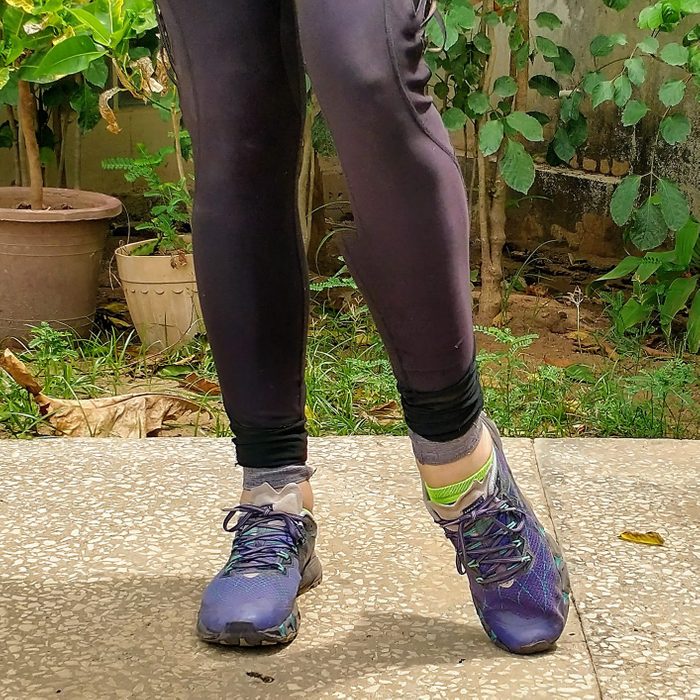
1. Ankle circles
To work directly on active ankle mobility, complete a series of ankle circles. These include ankle flexion, extension, inversion, and eversion—basically all of the ways your ankle moves—which makes them a good warm-up for the other stretches.
How to do it
Stand tall with your feet hip-distance apart. Shift your weight slightly to the left and lift your right heel from the floor, leaving your toes engaged with the ground.
Perform an ankle circle with your right ankle, trying to “draw” as large a circle as you comfortably can with your ankle as you move it in a clockwise direction.
Perform 20 circles clockwise, then reverse the movement, performing 20 circles counterclockwise. Switch feet and perform the circles with your left ankle as well.
Complete three sets per side.
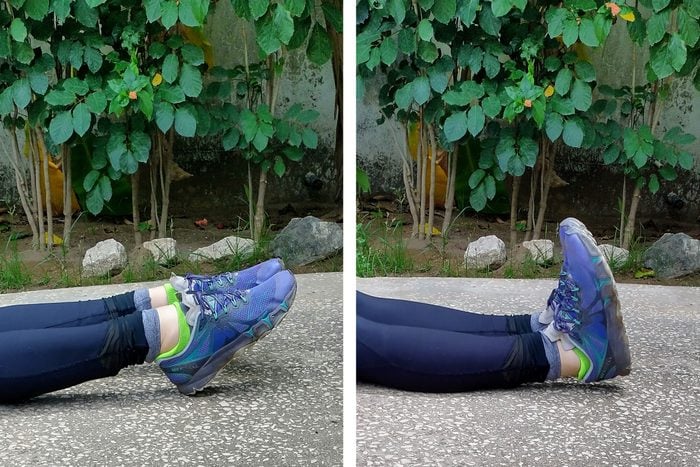
2. Ankle flexion and extension
The ankle flexion and extension exercise works, specifically, to maintain or increase the range of motion at your ankle as it relates to pointing your foot down toward the ground (extension) or pulling your toes upward (flexion).
How to do it
Sit on a mat with your legs extended in front of you. Keep your ankles at a natural, 90-degree angle and your toes pointing upward.
Moving both feet at the same time, extend your ankles, pointing your toes as far away from you as you can.
Hold for a beat at the full extension, then reverse the movement, flexing your foot to see how close to your shins you can bring your toes.
Continue alternating between flexion and extension for 20 repetitions. Complete two sets.
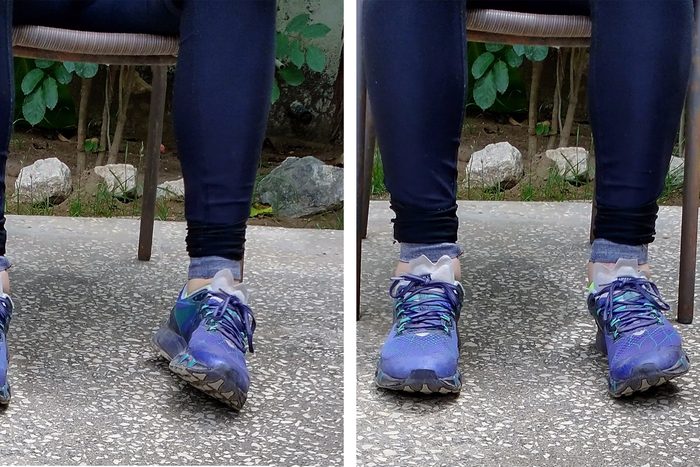
3. Ankle inversion and eversion
Inversion is the act of rolling your foot and ankle away from your body’s midline, while eversion is the act of rolling your foot and ankle toward your body’s midline.
In other words, if you’re standing up, inversion lifts your arch away from the ground, and eversion presses your arch closer to the ground.
How to do it
To perform this active mobility stretch, sit on a chair or bench with your feet roughly hip-distance apart.
It’s very easy to let your hips and knees help you to do this stretch, but it’s important to isolate the ankle. So you may want to press your arm into your knee to keep it and your thigh from moving as you perform the exercise.
Start with your feet flat on the ground, your toes pointing straight ahead. With your right foot, roll your ankle outward as far as possible (inversion). Hold for a beat at the end of the stretch.
Reverse the movement and roll your ankle inward as far as possible (eversion). Hold for a beat.
Continue the back-and-forth exercise, inverting and everting 20 times each before switching feet.
Complete two sets per side.
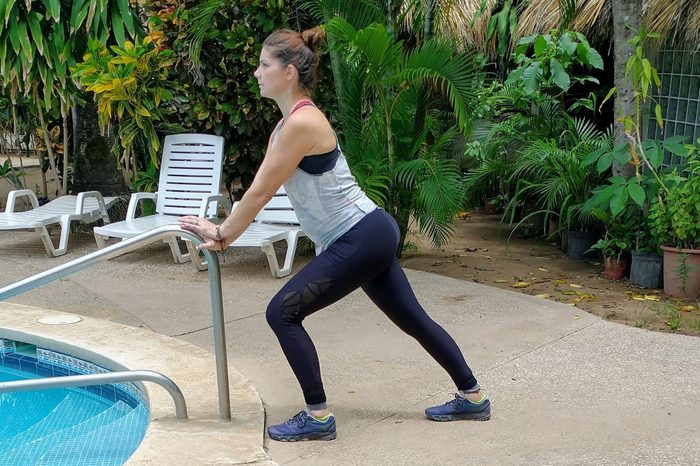
4. Gastroc stretch
The gastroc stretch targets the gastrocnemius, one of two major muscles in your calves.
Tight calves can directly affect ankle mobility, so it’s important to stretch them on a regular basis.
The gastroc stretch and soleus stretch are very similar, so it’s important to pay attention to the details and do them both.
How to do it
Stand facing a wall, your feet about hip-distance apart. You should be able to touch the wall with your hands when you extend your arms in front of your chest.
Take a step toward the wall with your right foot, placing your hands on the wall. Both feet should be pointing straight ahead, and your left leg should remain fully extended, your heels remaining in contact with the ground.
Lean toward the wall until you feel a stretch to the back of your left calf. Hold for 20 to 30 seconds.
Relax and switch legs. Complete a total of three sets per leg.
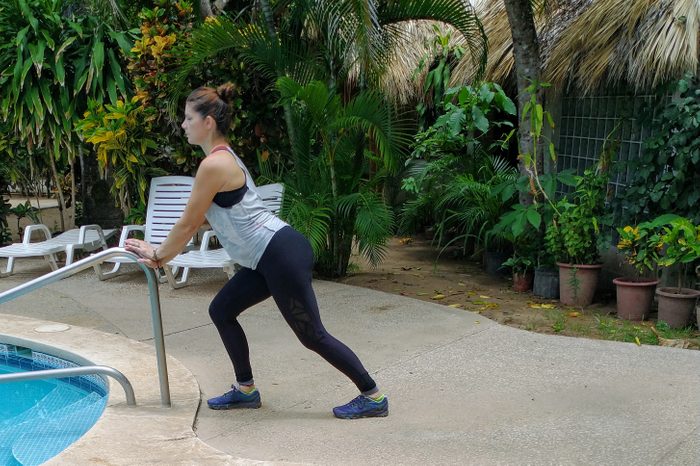
5. Soleus stretch
The soleus stretch targets the soleus, the other major muscle in your calves.
There’s only one difference between the soleus stretch and gastroc stretch: you keep the back leg fully extended to performing the gastroc stretch, but you bend the back knee when performing the soleus stretch.
How to do it
Stand facing a wall with your feet about hip-distance apart. You should be able to touch the wall with your hands when you extend your arms in front of your chest.
Step toward the wall with your right foot, placing your hands on the wall. Both feet should be pointing straight ahead, with your heels remaining in contact with the ground.
Lean forward, bending your left knee as you do. Continue leaning until you feel a stretch in the back of your left calf.
Hold for 20 to 30 seconds. Relax and switch legs.
Complete a total of three sets per leg.




